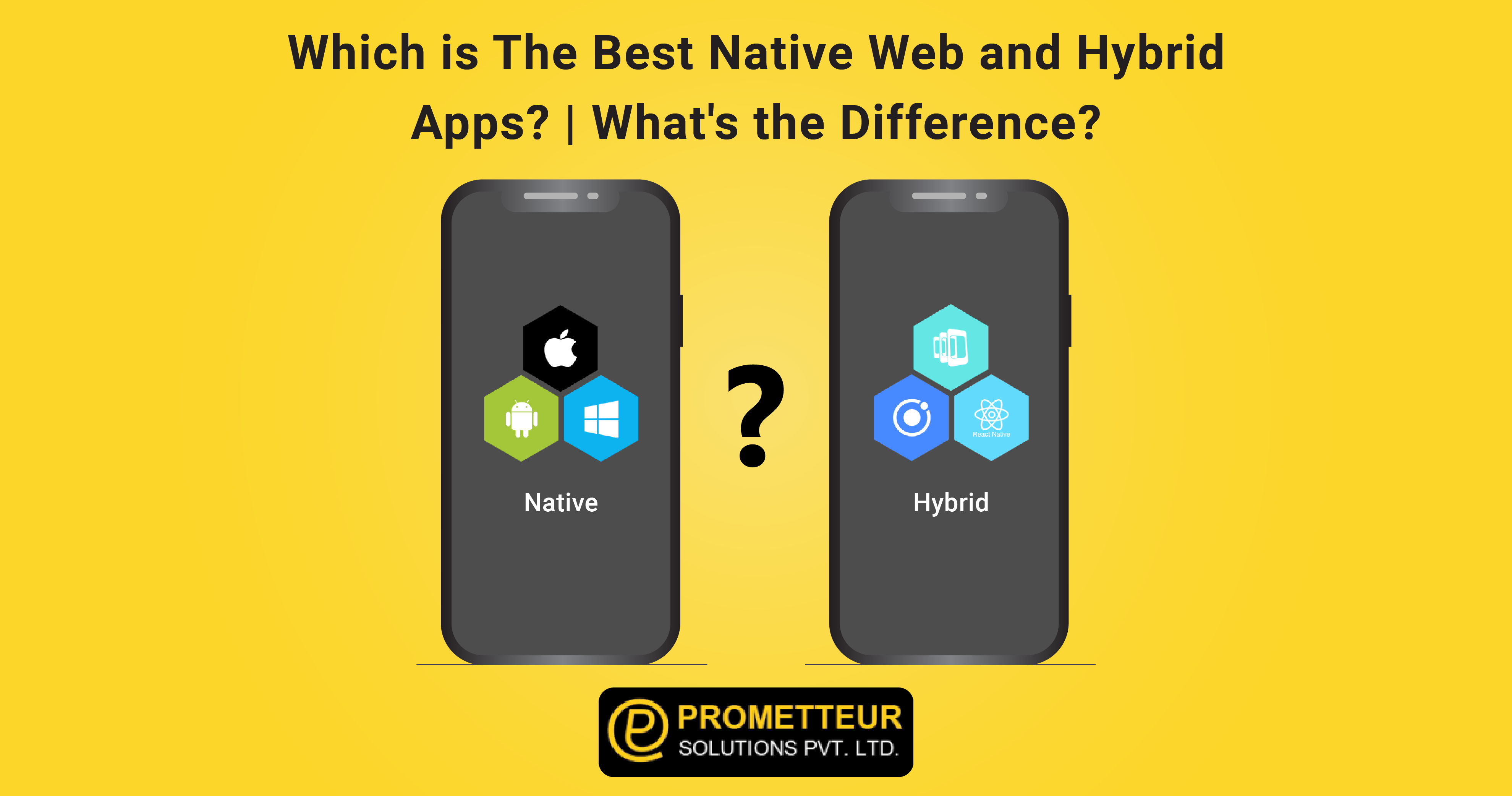The mobile app market is saturated with apps, which means the competition is fierce. It’s a critical decision to pick a safe, reliable developer for your app.
This comprehensive guide will look at the many sorts of mobile apps that are available and compare them from the perspective of a firm wanting to develop or hire someone to design a Native vs Hybrid vs Web App.
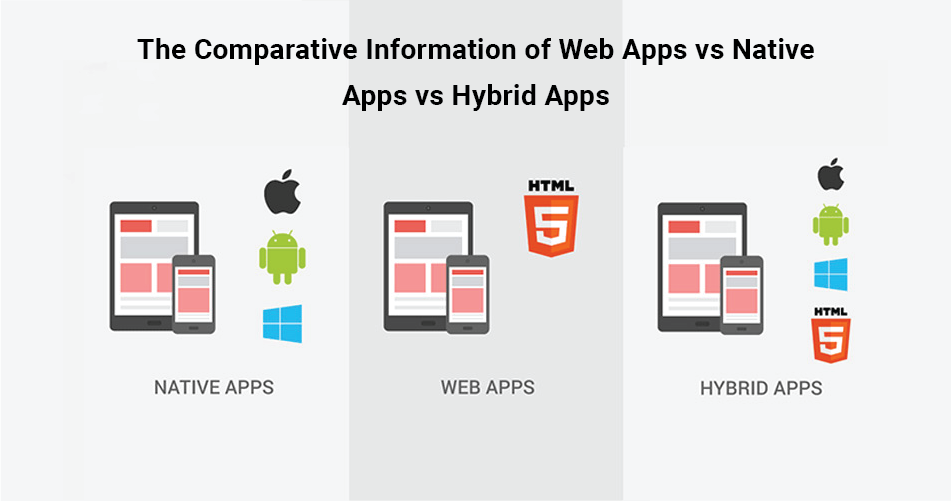
We’ll look at the many sorts of mobile apps available and compare them from the perspective of a firm wanting to develop or hire someone to design a mobile app. This is a critical decision that might determine a company’s success in the mobile app market. Choosing between Mobile Apps is a difficult task. Native vs Hybrid vs Web Apps: What’s the Difference?
What Is A Web App?
Individuals and companies alike face many obstacles in the way of launching a new website. From hiring developers and designers to procuring hosting and domains, it can be difficult to start a project of this magnitude. Let’s look at a different way to define a web app and a way of approaching a challenge that many app developers face.
A web app is an application that lives in the web browser of a personal computer or mobile device. What makes web apps unique and special is that they can be built with only a web browser and no other tool.
What this means for mobile app developers is that a web app is truly a web application, which is built without any Native Apps vs Hybrid Apps tool. A great use case for Native vs Hybrid vs Web Apps is that a developer can build and add any feature, plug-in, or integration in the browser so that the developer has full control over what a user can see and do.
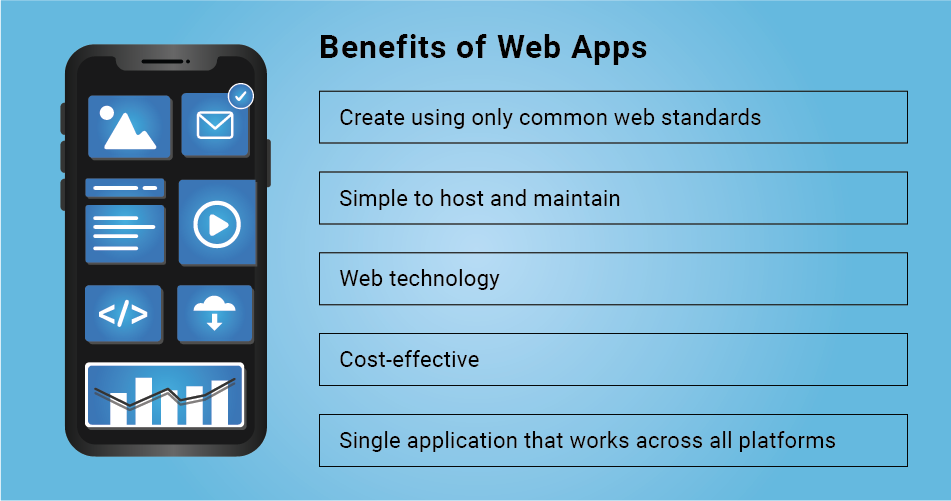
Web Apps Have the Following Benefits:
1. They are created using only common web standards such as HTML, CSS, and JavaScript. You do not need to learn any challenging languages such as Java or Swift.
2. Simple to host and maintain; simply upload to a domain-based hosting account.
3. Another benefit is that you can use whatever web technology and stack you want.
4. Web applications are also the most cost-effective alternative.
5. You can create a single application that works across all platforms. iOS, Android, Blackberry, and Windows Phone are the most popular mobile operating systems.
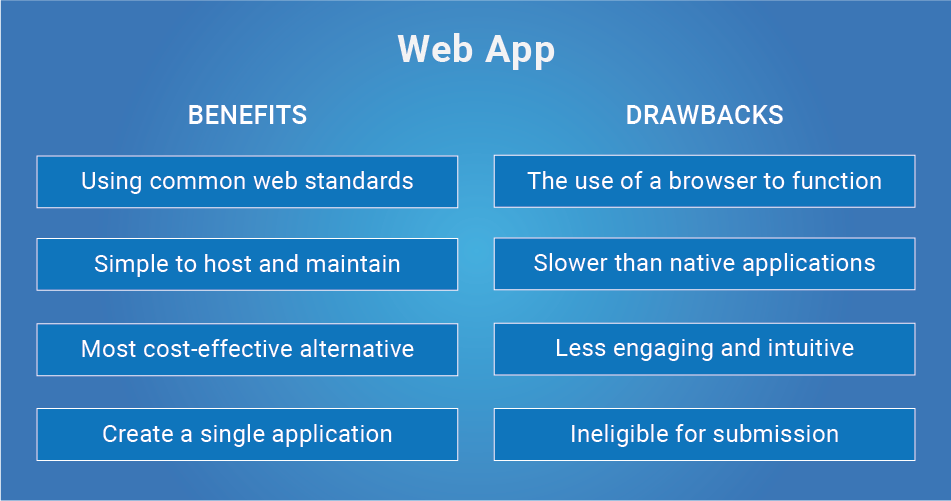
Web Apps Have Drawbacks
The first is that it requires the use of a browser to function.
2. Web applications are typically slower than Native vs Hybrid vs Web Apps applications.
3. Web apps are less engaging and intuitive than desktop programs. Buttons don’t have the same level of interactivity as native apps.
4. The program must be run in the browser.
5. Web apps are likewise ineligible for submission to app marketplaces.
What Is A Native App?
Native apps are hard to make, hard to sustain, and hard to continue to be relevant in the world of app stores. Native vs Hybrid vs Web Apps are not just limited to mobile apps.
Businesses that want an app for their desktop or laptop must create different versions of their product for every single platform out there.
Native vs Hybrid vs Web Apps are the solution. They’re easy to design and build, require zero maintenance, and work on any browser without any downloads required. Get off the mobile rollercoaster with a web app today!
Native apps are those that are coded specifically for iOS, Android, and Windows Phone, whereas web apps are those that work on any type of web browser. Mobile web apps are the best of both worlds as the user does not need to download anything, but is still able to interact with your website. Mobile web apps are not available on all of these platforms.
Native apps are coded specifically for iOS, Android, and Windows Phone–Hybrid Apps are not coded specifically for these platforms, but use web technologies to achieve what Native vs Hybrid vs Web Apps can be available on iOS, Android, and Windows Phone.
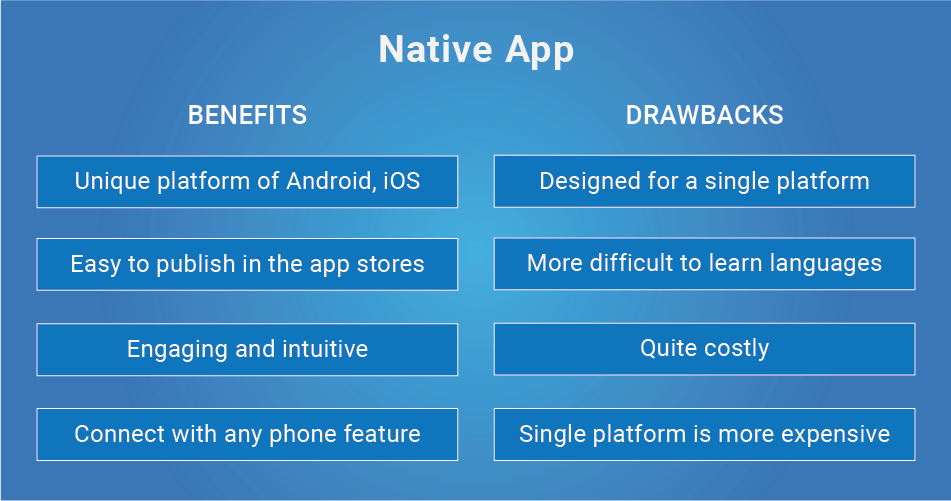
Native applications have the following advantages:
1. They are really quick, as I previously stated because they are developed for the unique platform of Android, iOS, or Windows Phones.
2. App Store, Google Play, or Windows Store, even though native programs are relatively easy to publish in the app stores.
3. Native apps are also considerably more engaging and intuitive, making user input and output go much more smoothly.
4. They can connect with nearly any phone feature, including the camera, location, storage, and compass.
Native Web Drawbacks
1. Native apps are designed for a single platform; for example, if you write an Android app in Java, it will only run on Android.
2. These are also considerably more difficult to learn languages.
3. Hiring developers for these languages is quite costly in comparison to hiring a regular web developer.
4. In addition to being more difficult to build, having a single platform is also more expensive. They’re also more difficult to keep up with.
What Is A Hybrid App?
Nowadays, every company needs a mobile presence, but Android and iOS take up a lot of valuable time from your developers. Clients often want the best of both worlds — Native Apps vs Hybrid Apps that are fast and sleek with a speedy interface, and a web app that looks great on any screen.
Plus, you might not have the budget for two separate teams of developers. You can use Mobile App Solutions’ hybrid apps to switch back and forth between HTML5 and native code whichever way you need it.
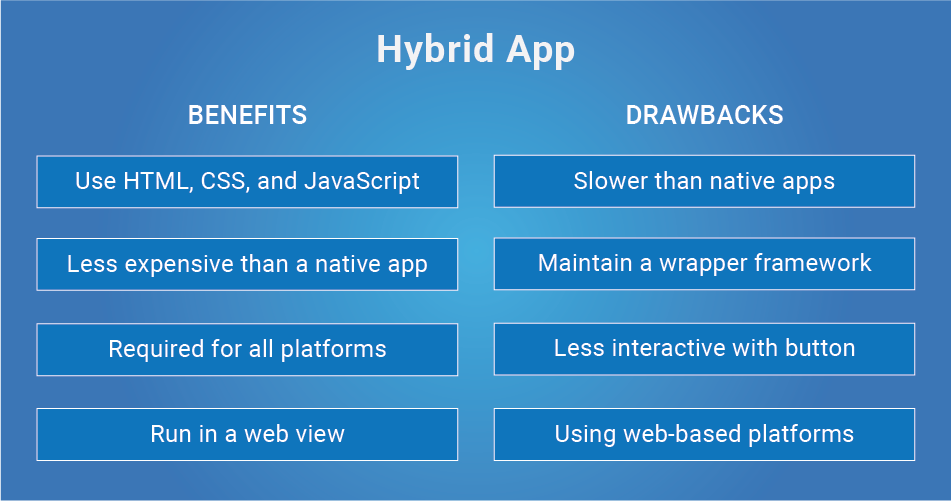
A hybrid app is a mobile application in the sense of HTML5. You can develop it completely in HTML5, JavaScript, and CSS and then you can distribute it as a native application or you can distribute it as a hybrid app which is a combination of native and web technologies. Other companies are offering entirely HTML5 mobile applications but this is not the focus of ours.
Hybrid apps are kind of the intermediate between both native and web apps and they are looking to convert those web apps into native applications. HTML5 is, in many ways, a more Native vs Hybrid vs Web Apps mobile technology. The reason why I would say this is true is that you can access a lot more resources than you would have using JavaScript and CSS.
Advantages and Disadvantages of Hybrid Apps
Hybrid App Development Advantages
1. Web-based hybrid apps that use HTML, CSS, and JavaScript.
2. They’re also a lot less expensive than a native app. If you need developers, a web developer is far less expensive than a Swift developer. Learn about Native vs Hybrid vs Web Apps
3. Only one app is required for all platforms. They can create this if you use a technology like Cordova or PhoneGap, which is a wrapper for hybrid apps.
4. Unlike a web app, hybrid applications run in a web view, thus no browser is required. They may be distributed throughout all app stores.
Hybrid App Development’s Drawbacks
1. Hybrid apps are typically slower than native apps vs Hybrid Apps
2. They are more expensive than normal web apps since you must work with and maintain a wrapper framework.
3. They can also be less interactive with things like button pushes and the like.
4. There is an exception, or perhaps a fourth type of mobile app, which is created using web-based platforms.
Why Do Companies Use Different Mobile Apps?
Mobile apps are fun and can provide many benefits to their users. However, there is a lot of confusion as to why companies need mobile apps and what they do with them. A mobile app for business is extremely important. It’s the first step in the digital transformation of your business! There are many benefits of having a mobile app, such as convenience, streamlining processes, saving time and money, and more!
Mobile apps are not just fancy gadgets. They provide tools that can be used for many different purposes. Companies use different mobile apps for different purposes Native vs Hybrid vs Web Apps. Some of the most common reasons why companies use mobile apps are:
- To offer services: Businesses use mobile apps to offer different services to their customers in the most comfortable ways so that the customer can access these services by making a few clicks and interacting with the mobile app.
- To promote their brand: Companies use mobile apps to promote and manage their brands.
- To improve customer service: After creating a mobile app for your business, your customers will be happy because they can easily contact customer support and have their issues resolved within a few minutes of complaint.
- To keep customers engaged with their company on the go: Mobile apps easily engage users since the user accesses different services from their fingertips.
Conclusion
In conclusion, we think the points raised and discussed during this article give developers and businesses a solid perspective of where we are currently with mobile technology and give you a good visual that can help you assess and improve your choices and experiences with the type of Native vs Hybrid vs Web Apps you are looking to build for your business.
So, suppose you are looking for the best digital company to help you study your business and to decide on the best mobile app. In that case, you can contact Prometteur Solutions and we will be delighted to assist you to achieve your business goals, using a mobile application.
